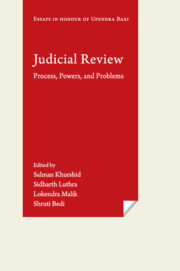Book contents
- Frontmatter
- Contents
- Foreword
- Editors' Note
- Introduction
- 1 The Inadequacy of Judicial Enforcement of Constitutional Rights Provisions to Rectify Economic Inequality, and the Inevitability of the Attempt
- 2 The Interplay of Law and Politics in India
- 3 Beating the Backlog: Reforms in Administration of Justice in India
- 4 Judicial Review: Perspectives and Reflections for the Twenty-First Century
- 5 When ‘Creeping Jurisdiction’ Goes Awry: The Social Action Litigation to Ban Surrogacy
- 6 Judicial Review and the Democratic Judge
- 7 Judicial Review: A Tool to Shape Constitutional Jurisprudence
- 8 The Baxian Bioscope on Indian Judicial Process
- 9 Judicial Activism, Courts, and Constitutional Revolutions: The Israeli Case
- 10 Democracy, Constitution, and Judicial Review: A Critique
- 11 A Minor Jurisprudence of Pathos: Upendra Baxi as Teacher and Writer
- 12 The Need for Reinventing the Supreme Court as a Constitutional Court
- 13 Appointment of ‘Distinguished Jurists’ as Judges in the Supreme Court of India: A Critical Analysis
- 14 Judicial Dissent and Judicial Review: A Functional Analysis
- 15 The Power of Judicial Review: Judicial Chutzpah or Judicial Desideratum
- 16 Judicial Review of Legislations by Tribunals in India: Law, Problems, and Perspectives
- 17 Criminalization of Membership of Terrorist Organizations in India and the United States of America: Human Rights Concerns
- 18 Article 142 of the Indian Constitution: On the Thin Line between Judicial Activism and Restraint
- 19 Sketching the Limits of Article 142 of the Constitution of India: A Constitutional Necessity
- 20 Constitutional Morality and Judges of the Supreme Court
- About the Contributors
- Index
1 - The Inadequacy of Judicial Enforcement of Constitutional Rights Provisions to Rectify Economic Inequality, and the Inevitability of the Attempt
Published online by Cambridge University Press: 23 January 2020
- Frontmatter
- Contents
- Foreword
- Editors' Note
- Introduction
- 1 The Inadequacy of Judicial Enforcement of Constitutional Rights Provisions to Rectify Economic Inequality, and the Inevitability of the Attempt
- 2 The Interplay of Law and Politics in India
- 3 Beating the Backlog: Reforms in Administration of Justice in India
- 4 Judicial Review: Perspectives and Reflections for the Twenty-First Century
- 5 When ‘Creeping Jurisdiction’ Goes Awry: The Social Action Litigation to Ban Surrogacy
- 6 Judicial Review and the Democratic Judge
- 7 Judicial Review: A Tool to Shape Constitutional Jurisprudence
- 8 The Baxian Bioscope on Indian Judicial Process
- 9 Judicial Activism, Courts, and Constitutional Revolutions: The Israeli Case
- 10 Democracy, Constitution, and Judicial Review: A Critique
- 11 A Minor Jurisprudence of Pathos: Upendra Baxi as Teacher and Writer
- 12 The Need for Reinventing the Supreme Court as a Constitutional Court
- 13 Appointment of ‘Distinguished Jurists’ as Judges in the Supreme Court of India: A Critical Analysis
- 14 Judicial Dissent and Judicial Review: A Functional Analysis
- 15 The Power of Judicial Review: Judicial Chutzpah or Judicial Desideratum
- 16 Judicial Review of Legislations by Tribunals in India: Law, Problems, and Perspectives
- 17 Criminalization of Membership of Terrorist Organizations in India and the United States of America: Human Rights Concerns
- 18 Article 142 of the Indian Constitution: On the Thin Line between Judicial Activism and Restraint
- 19 Sketching the Limits of Article 142 of the Constitution of India: A Constitutional Necessity
- 20 Constitutional Morality and Judges of the Supreme Court
- About the Contributors
- Index
Summary
Introduction
The legal philosopher H. L. A. Hart wrote a widely cited article with the subtitle ‘The Nightmare and the Noble Dream’. For Hart the nightmare was American Legal Realism's claim that legal doctrine had no determinate content, that every judicial decision was ‘an uncontrolled act of lawmaking’, while the noble dream was Ronald Dworkin's hope that all serious legal questions had a single correct answer compatible with morality's dictates. Although Hart was not explicit, he hinted that, should jurisprudes wake from their sleep, they could have a view of the judicial process as neither a nightmare nor a noble dream, but as a realistic human enterprise suitable for workaday use.
In this brief chapter honouring the work of Upendra Baxi, I argue that the pursuit of judicially enforced social welfare and equality rights in the modern world is both a nightmare and a noble dream, that in contemporary circumstances the effort to enforce social welfare rights in the courts is bound to fail but must be pursued. I note at the outset that this chapter is not an exegesis of Baxi's work, nor a self-conscious effort to extend it. Rather, I offer my own reflections on some issues to which Baxi has paid attention.
I begin with social welfare rights even though they are typically described as ‘second generation’ rights with a more recent origin than equality rights. The reason is that the argument I develop to explain why judicial enforcement of social welfare rights is a nightmare transfers to the equality setting, but is more difficult to develop from the ground up in that context.
The Limits on Judicial Enforcement of Social Welfare Rights
The Mexican Constitution of 1917 was the first to include social welfare rights. It was assumed then and for several decades thereafter that these rights provided political guidance to legislators but were not judicially enforceable. That understanding was widespread but not, I think, deeply theorized. It seems to have arisen in part from a sense that the ways in which social welfare rights would be provided were highly various and subject to largely discretionary political choices: Social democrats had their policy proposals for realizing social welfare rights, liberals their own different proposals, and communists yet another set.
- Type
- Chapter
- Information
- Judicial Review , pp. 13 - 26Publisher: Cambridge University PressPrint publication year: 2020
- 1
- Cited by



